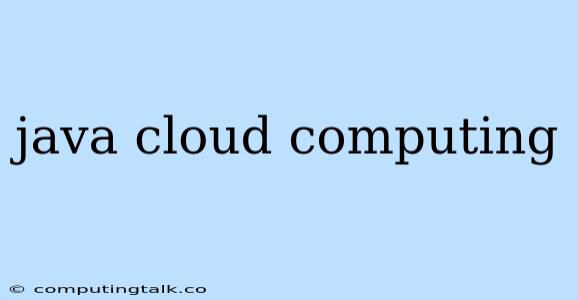The Power of Java in the Cloud: A Modern Approach to Software Development
Java, a robust and versatile programming language, has long been a staple in software development. Its popularity stems from its platform independence, strong community support, and vast ecosystem of libraries and frameworks. With the rise of cloud computing, Java's role has become even more crucial, offering developers a powerful toolkit for building scalable, reliable, and cost-effective applications.
What is Java Cloud Computing?
Java cloud computing refers to the use of Java technology in conjunction with cloud computing services. This means leveraging the capabilities of cloud platforms like Amazon Web Services (AWS), Microsoft Azure, or Google Cloud Platform (GCP) to deploy, manage, and scale Java applications.
Why Choose Java for Cloud Computing?
Java boasts several advantages that make it an ideal choice for cloud development:
- Platform Independence: Java's "write once, run anywhere" philosophy allows developers to build applications that can run seamlessly across different cloud environments. This eliminates the need for rewriting code for each platform, saving time and resources.
- Scalability and Reliability: Cloud platforms offer robust infrastructure and services that enable Java applications to scale effortlessly to handle increasing workloads. Java's inherent multi-threading and concurrency features make it particularly well-suited for handling large-scale operations.
- Cost-Effectiveness: Cloud services offer a pay-as-you-go model, allowing developers to optimize costs by only paying for the resources they use. This is especially beneficial for startups and businesses with fluctuating workloads.
- Security: Cloud providers invest heavily in security measures, providing a secure environment for Java applications. Java's built-in security features further enhance the overall security posture.
- Developer Productivity: The rich Java ecosystem provides developers with a vast collection of libraries, frameworks, and tools that simplify cloud development tasks. Frameworks like Spring Boot and Micronaut streamline application development, while tools like Maven and Gradle automate build processes.
How Does Java Work in the Cloud?
Java applications running in the cloud can take different forms:
- Serverless Computing: Deploying Java code as serverless functions allows developers to run code without managing servers. This offers great flexibility and cost efficiency.
- Containers: Using container technologies like Docker, developers can package Java applications with their dependencies into portable units. This makes deployment and scaling simpler and more efficient.
- Virtual Machines: Traditional Java applications can be deployed on virtual machines (VMs) hosted in the cloud. This offers a familiar approach with access to a wide range of configurations.
Key Considerations for Java Cloud Development
When building Java applications for the cloud, several factors must be considered:
- Choosing the Right Cloud Platform: Each cloud provider offers different services and pricing models. Carefully evaluate your specific needs and choose the platform that best aligns with your project requirements.
- Optimizing for Performance: Ensure your Java applications are optimized for the cloud environment to achieve maximum efficiency and performance. This may involve using techniques like caching, asynchronous processing, and load balancing.
- Security Best Practices: Implement strong security measures throughout the development lifecycle to protect your applications and data. This includes using secure coding practices, properly configuring cloud services, and implementing robust authentication and authorization mechanisms.
- Monitoring and Logging: Regularly monitor your Java applications in the cloud to identify any performance issues or security threats. Leverage the logging and monitoring capabilities provided by the cloud platform to gain valuable insights into your application's behavior.
Java Cloud Computing in Action: Real-World Examples
Java is widely used in various cloud-based applications across industries:
- Web Applications: Frameworks like Spring Boot and Jakarta EE enable the development of scalable and reliable web applications hosted on cloud platforms.
- Microservices: Java is a popular choice for building microservices architectures, where applications are broken down into smaller, independent services. This promotes modularity, scalability, and fault tolerance.
- Big Data Analytics: Frameworks like Apache Spark and Apache Kafka leverage Java to process and analyze large datasets in the cloud, enabling businesses to gain valuable insights.
- Machine Learning and AI: Java is used for building and deploying machine learning models in the cloud. Libraries like TensorFlow and Deeplearning4j provide powerful tools for developing AI applications.
Conclusion
Java cloud computing offers a powerful and efficient way to build modern, scalable, and reliable applications. By leveraging the advantages of Java and cloud platforms, developers can unlock new possibilities and meet the ever-increasing demands of the digital world. As cloud computing continues to evolve, Java will undoubtedly remain a cornerstone of this technological revolution, empowering developers to create innovative solutions that transform businesses and our lives.
